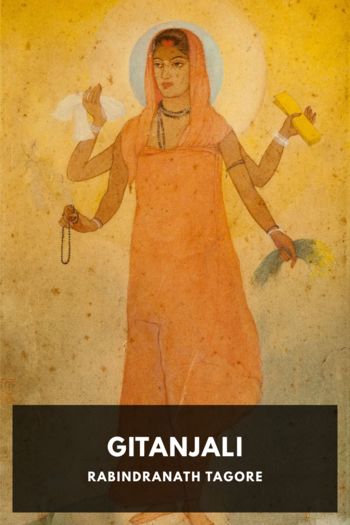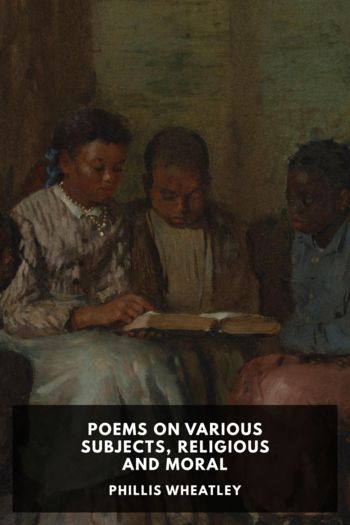My Reminiscences by Rabindranath Tagore (free children's ebooks pdf .TXT) 📕

- Author: Rabindranath Tagore
Book online «My Reminiscences by Rabindranath Tagore (free children's ebooks pdf .TXT) 📕». Author Rabindranath Tagore
Let me set down here part of what I wrote in a letter, at a more advanced age, about the Morning Songs.
“There is none in the World, all are in my heart”—is a state of mind belonging to a particular age. When the heart is first awakened it puts forth its arms and would grasp the whole world, like the teething infant which thinks everything meant for its mouth. Gradually it comes to understand what it really wants and what it does not. Then do its nebulous emanations shrink upon themselves, get heated, and heat in their turn.
To begin by wanting the whole world is to get nothing. When desire is concentrated, with the whole strength of one’s being upon any one object whatsoever it might be, then does the gateway to the Infinite become visible. The morning songs were the first throwing forth of my inner self outwards, and consequently they lack any signs of such concentration.
This all-pervading joy of a first outflow, however, has the effect of leading us to an acquaintance with the particular. The lake in its fullness seeks an outlet as a river. In this sense the permanent later love is narrower than first love. It is more definite in the direction of its activities, desires to realise the whole in each of its parts, and is thus impelled on towards the infinite. What it finally reaches is no longer the former indefinite extension of the heart’s own inner joy, but a merging in the infinite reality which was outside itself, and thereby the attainment of the complete truth of its own longings.
In Mohita Babu’s edition these Morning Songs have been placed in the group of poems entitled Nishkraman, The Emergence. For in these was to be found the first news of my coming out of the Heart Wilderness into the open world. Thereafter did this pilgrim heart make its acquaintance with that world, bit by bit, part by part, in many a mood and manner. And at the end, after gliding past all the numerous landing steps of ever-changing impermanence, it will reach the infinite—not the vagueness of indeterminate possibility, but the consummation of perfect fullness of Truth.
From my earliest years I enjoyed a simple and intimate communion with Nature. Each one of the coconut trees in our garden had for me a distinct personality. When, on coming home from the Normal School, I saw behind the skyline of our roof-terrace blue-grey water-laden clouds thickly banked up, the immense depth of gladness which filled me, all in a moment, I can recall clearly even now. On opening my eyes every morning, the blithely awakening world used to call me to join it like a playmate; the perfervid noonday sky, during the long silent watches of the siesta hours, would spirit me away from the work-a-day world into the recesses of its hermit cell; and the darkness of night would open the door to its phantom paths, and take me over all the seven seas and thirteen rivers, past all possibilities and impossibilities, right into its wonderland.
Then one day, when, with the dawn of youth, my hungry heart began to cry out for its sustenance, a barrier was set up between this play of inside and outside. And my whole being eddied round and round my troubled heart, creating a vortex within itself, in the whirls of which its consciousness was confined.
This loss of the harmony between inside and outside, due to the overriding claims of the heart in its hunger, and consequent restriction of the privilege of communion which had been mine, was mourned by me in the Evening Songs. In the Morning Songs I celebrated the sudden opening of a gate in the barrier, by what shock I know not, through which I regained the lost one, not only as I knew it before, but more deeply, more fully, by force of the intervening separation.
Thus did the First Book of my life come to an end with these chapters of union, separation and reunion. Or, rather, it is not true to say it has come to an end. The same subject has still to be continued through more elaborate solutions of worse complexities, to a greater conclusion. Each one comes here to finish but one book of life, which, during the progress of its various parts, grows spiral-wise on an ever-increasing radius. So, while each segment may appear different from the others at a cursory glance, they all really lead back to the selfsame starting centre.
The prose writings of the Evening Songs period were published, as I have said, under the name of Vividha Prabandha. Those others which correspond to the time of my writing the Morning Songs came out under the title of Alochana, Discussions. The difference between the characteristics of these two would be a good index of the nature of the change that had in the meantime taken place within me.
Part VII XXXV Rajendrahal MitraIt was about this time that my brother Jyotirindra had the idea of founding a Literary Academy by bringing together all the men of letters of repute. To compile authoritative technical terms for the Bengali language and in other ways to assist in its growth was to be its object—therein differing but little from the lines on which the modern Sahitya Parishat, Academy of Literature, has taken shape.
Dr. Rajendrahal Mitra took up the idea





Comments (0)